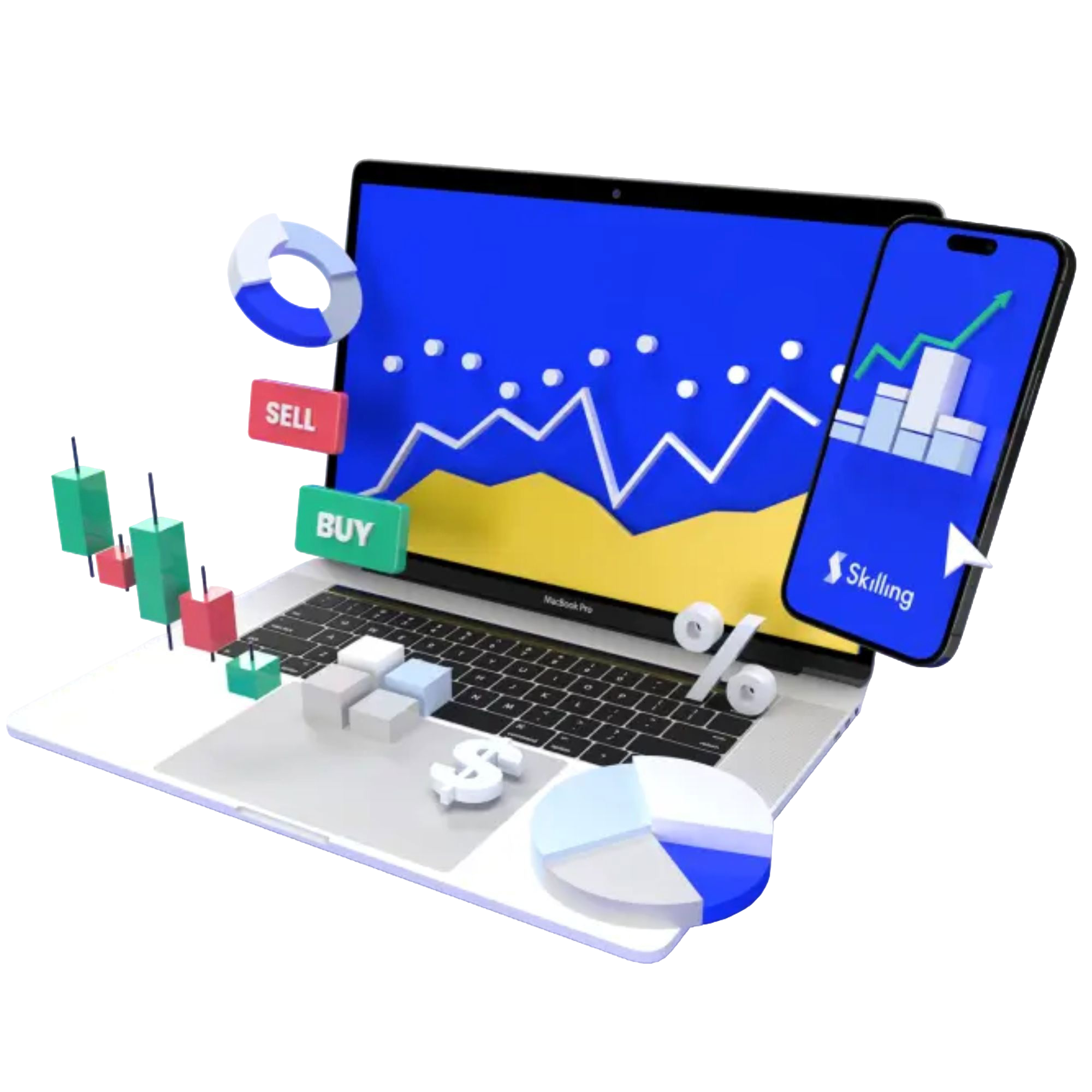Indices are essential tools in the financial markets, providing insights into the overall performance of specific sectors or economies. They help investors track market trends and make informed decisions. At Skilling, we offer access to a wide range of world indices, enabling you to diversify your CFD trading portfolio.
This article will explain what indices are, highlight the main world indices available on Skilling, and provide a step-by-step guide on how to trade these indices online.
What are indices?
Indices, or stock market indices, are statistical measures that track the performance of a group of stocks. Each index represents a specific segment of the market, such as the overall market, a sector, or an asset class. By following an index, investors can gauge market performance, compare individual stock performance against the market, and make strategic investment decisions.
Capitalise on volatility in index markets
Take a position on moving index prices. Never miss an opportunity.
71% of retail CFD accounts lose money.

Key functions:
- Benchmarking: Provide a benchmark for evaluating the performance of individual investments.
- Market sentiment: Reflect the overall mood and trends of the market.
- Diversification: Offer diversified exposure to various stocks within the index.
What are the main world indices?
1. S&P 500:
Tracks the performance of 500 of the largest publicly traded companies in the United States. It is widely regarded as one of the best representations of the U.S. stock market.
Skilling Symbol: SPX500.
2. US 100:
Comprises 100 of the largest non-financial companies listed on the US Stock Market, focusing heavily on technology and innovation sectors.
Skilling Symbol: US100.
3. Dow Jones Industrial Average (US30):
Measures the performance of 30 significant U.S. companies across various industries. It is one of the oldest and most recognized indices globally.
Skilling Symbol: US30.
4. FTSE 100:
Represents the 100 largest companies listed on the London Stock Exchange. It is a key indicator of the UK stock market.
Skilling Symbol: UK100.
5. DAX40:
Tracks the 40 largest and most liquid companies listed on the Frankfurt Stock Exchange in Germany, reflecting the health of the German economy.
Skilling Symbol: DE40.
6. Nikkei 225:
Comprises 225 of the most prominent companies listed on the Tokyo Stock Exchange, providing insights into the Japanese economy.
Skilling Symbol: JAP225.
7. CAC 40:
Represents the 40 largest companies listed on the Euronext Paris, offering a snapshot of the French stock market.
Skilling Symbol: FRA40.
8. ASX 200:
Tracks the performance of the 200 largest companies listed on the Australian Securities Exchange, indicating the overall performance of the Australian market.
Skilling Symbol: AUS200.
9. IBRX 50:
Tracks the performance of 50 of the most liquid and highly capitalized stocks from Brazil.
Skilling Symbol: IBRX50.
10. EU Stocks 50:
The EU Stocks 50 is an index composed of the top 50 stocks listed on the European stock exchanges.
Skilling Symbol: EUSTX50.
Steps to trade world indices CFD online with Skilling
Trading world indices CFD online is a straightforward process. Here’s how you can get started with Skilling:
- Sign up: Visit the Skilling website and create an account. The registration process is quick and user-friendly.
- Verify your account: Complete the necessary verification steps to comply with regulatory requirements. This typically involves providing identification and proof of address.
- Deposit funds: Fund your trading account using your preferred payment method. Skilling supports various deposit options for your convenience.
- Choose an index: Select the index you wish to trade from the range available on Skilling. Use the platform’s tools to analyze market trends and decide which index aligns with your trading strategy.
- Place your trade: Execute your trade by setting the amount you wish to invest and any stop-loss or take-profit orders to manage risk.
- Monitor and adjust: Continuously monitor your trades and adjust your strategy as needed. Utilize Skilling’s advanced trading tools and resources to stay informed about market movements.
Practice with a Demo Account
Try our demo account and experience real market conditions.
71% of retail CFD accounts lose money.

Summary
Indices are invaluable tools for investors and traders, providing a snapshot of market performance and helping guide investment decisions. Skilling offers access to a variety of major world indices, including the S&P 500, NASDAQ 100, FTSE 100, and more. Remember, this is not investment advice, and past performance does not guarantee or predict future performance.
By understanding how to trade these indices online, you can diversify your portfolio and take advantage of global market opportunities. Follow the steps outlined to start trading indices with confidence and make informed decisions to achieve your financial goals.
FAQs
1. What are indices?
Indices are statistical measures that track the performance of a group of stocks, representing specific segments of the market.
2. What are the main world indices?
Main world indices include the S&P 500, NASDAQ 100, Dow Jones Industrial Average, FTSE 100, DAX 30, Nikkei 225, CAC 40, and ASX 200.
3. How can I trade world indices online?
To trade indices online, sign up with Skilling, verify your account, deposit funds, choose an index, place your trade, and monitor your positions.
4. Why are indices important?
Indices provide benchmarks for evaluating investment performance, reflect market sentiment, and offer diversified exposure to various stocks.
5. What are the benefits of trading indices?
Trading indices allow for diversification, exposure to broad market movements, and the potential to capitalize on global economic trends.
By leveraging the advantages of trading indices and understanding the market dynamics, traders can better navigate the financial markets. For example, gold price can affect main world indices values in certain circumstances.











